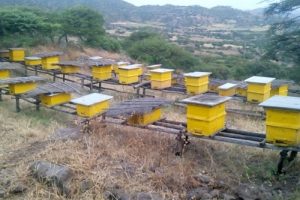
Ethiopia, as a country, is known for its rich natural resources and hosts vast reserves of soda ash mineral in different parts of the nation. Soda ash is a versatile chemical compound used in various industries, including glass manufacturing, chemicals, detergents, and metallurgy. Its wide range of applications makes it a valuable raw material contributing to the growth and development of these sectors.
Different sources indicated that there is much amount of soda ash mineral at the Abiata-Shalla lakes. With more than 380 million tons of soda ash available, the Abijata-Shalla Soda Ash Share Company has capitalized on this resource to significantly contribute to Ethiopia’s economy, so said Gemechu Negera, Head of the company.
Soda ash, also known as sodium carbonate, is a fundamental ingredient in various industries such as glass manufacturing, detergent production, and chemical processing. It plays a crucial role in neutralizing acidic solutions, controlling pH levels, and facilitating chemical reactions. The global demand for soda ash is substantial, and Ethiopia’s abundant reserves provide a strategic advantage in meeting both domestic and international requirements.
Noting that Soda ash is a commodity that Ethiopia is importing to meet its industrial needs, he avowed that the establishing the Abijata-Shalla Soda Ash Share Company has significantly reduced its dependence on imported soda ash. One of the key economic advantages of soda ash production in Ethiopia lies in import substitution. This import substitution strategy leads to cost savings, strengthens the country’s balance of trade, contributes to local job creation, and promotes the growth of local industries
Moreover, the availability of locally produced soda ash is catalyzing the growth of domestic industries. Previously, Ethiopian businesses importing soda ash faced challenges such as high transportation costs, import duties, and currency fluctuations. However, the presence of the Abijata-Shalla Soda Ash Share Company has alleviated these obstacles, empowering local industries to become more competitive and efficient. This increased competitiveness has spurred productivity gains and encouraged the growth of downstream industries, further strengthening Ethiopia’s economy.
The establishment and operation of the Abijata-Shalla Soda Ash Share Company has also facilitated technology transfer and knowledge exchange in Ethiopia. Collaborations with international partners and suppliers have allowed the company to adopt advanced production techniques, modern machinery, and efficient processes. This transfer of knowledge and technology has a ripple effect on domestic industries, as it promotes innovation and enhances productivity.
Through partnerships and collaborations, local employees receive training and exposure to best practices in soda ash production. This not only improves their skills but also creates a pool of expertise that can be leveraged for future industrial development. The knowledge exchange between international experts and local professionals contributes to the overall growth and competitiveness of Ethiopia’s manufacturing sector.
This production also brings the potential to drive regional development and economic integration. In this regard Gemechu emphasized that his office has a multiplier effect on the local economy, creating opportunities for suppliers, service providers, and other businesses in the surrounding areas. This stimulates economic activity, generates income, and improves the standard of living for communities in the vicinity.
It can also create numerous employment opportunities across various sectors. The establishment and operation of the Abijata-Shalla Soda Ash Share Company have directly provided more than 200 job opportunities for engineers, chemists, technicians, and administrative staff. Additionally, the growth of downstream industries that rely on soda ash has further expanded employment opportunities, benefiting the local workforce and contributing to poverty reduction, he stated.
Mentioning that Soda ash production has become a significant source of revenue for Ethiopia, he explained that the Company has carried out different activities to start exporting its product for the foreign market. Hence, it is also seemingly important to stabilize the country’s currency and finance essential imports.
The revenue generated from soda ash sales can also be reinvested in infrastructure development, education, healthcare, and other critical sectors, fueling overall economic growth.
Moreover, he elucidated that the presence of a reliable domestic source of soda ash has encouraged the diversification of Ethiopia’s industrial base. Industries that previously relied on imported soda ash can now expand their operations and explore new product lines. This diversification not only reduces dependency on specific sectors but also promotes innovation and competitiveness, fostering sustainable economic growth in the long term, he noted.
Soda ash production in Ethiopia is accompanied by a commitment to environmental sustainability. The Abijata-Shalla Soda Ash Share Company upholds social and environmental responsibility in its operations. By adhering to strict environmental management practices, the company minimizes its impact on the surrounding ecosystem.
As to Gemechu the Company employs modern technologies and rigorous environmental management practices to minimize its ecological footprint. Efforts are made to conserve water resources, manage waste responsibly, and mitigate any potential harm to the fragile ecosystem of the Abiata and Shalla lakes, he explained.
It can also spur industrial diversification in Ethiopia. Accordingly, industries can now expand their operations and explore new product lines. This diversification not only reduces dependency on specific sectors but also promotes innovation and competitiveness, fostering sustainable economic growth in the long term.
The presence of abundant soda ash reserves has attracted both domestic and foreign investors, leading to the establishment of new industries and the expansion of existing ones. This diversification strengthens the country’s industrial base and creates a more resilient economy, capable of withstanding external shocks. Moreover, the development of downstream industries leads to value addition, job creation, and the retention of foreign exchange within the country.
Additionally, the company implements social initiatives aimed at benefiting local communities. This includes supporting education and healthcare projects, providing employment opportunities for nearby residents, and engaging in corporate social responsibility activities. By prioritizing social and environmental responsibility, the soda ash industry in Ethiopia contributes to sustainable development and the well-being of local communities.
Additionally, the head emphasized that works and studies have been undertaken in order to inaugurate phase II Shalla lake soda ash production project. This will also enhance the economic development of the area and create job opportunities for the local population. The Shalla Lake soda ash production project aims to extract and process soda ash, which is a valuable mineral used in various industries such as glass manufacturing, detergent production, and chemical processing.
During phase two of the project, further research and studies have been conducted to ensure the efficient extraction and processing of soda ash from Shalla Lake. This includes evaluating the lake’s resources, implementing advanced technologies, and establishing sustainable practices to minimize environmental impact, he added.
All in all, the abundant reserves of soda ash in Ethiopia, coupled with the operations of the Abijata-Shalla Soda Ash Share Company, have brought significant economic advantages to the country. By substituting imports and promoting domestic industries, Ethiopia has reduced its dependence on foreign sources and fostered economic growth. The employment generation, revenue contribution, industrial diversification, and commitment to environmental sustainability make soda ash production a crucial component of Ethiopia’s economic development strategy.
As the industry continues to thrive, it is poised to contribute even more to the country’s overall progress in the years to come. The country can further position itself as a key player in the global soda ash market, driving economic growth and prosperity.
BY HIZKEL HAILU
THE ETHIOPIAN HERALD FRIDAY 2 FEBRUARY 2024





